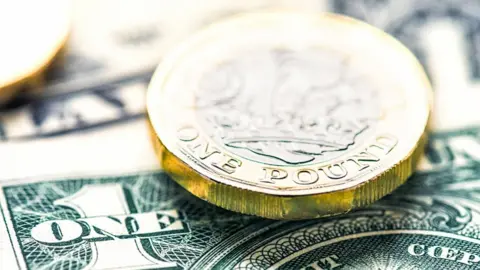Fed moves to ease strains as dollar demand surges
 Getty Images
Getty ImagesThe US central bank has moved to ease global currency strains as concerns about a global recession prompt a surge in demand for the US dollar.
The Federal Reserve said on Thursday it had established swap lines to help supply central banks in nine countries with dollars.
The countries include Brazil, Norway, and Australia.
The dollar had earlier hit a three-year high against the euro, while rising to a 30-year high against the pound.
The new swap lines add to arrangements the Fed already has with central banks elsewhere, including the Bank of England and European Central Bank.
The Fed said they would be in place for at least six months and make available up to $450bn (£390bn).
"These facilities... are designed to help lessen strains in global US dollar funding markets, thereby mitigating the effects of these strains on the supply of credit to households and businesses both domestically and abroad," the Fed said.
The coronavirus pandemic has caused major turmoil in global markets as investors grow more concerned about its economic effects and dump stocks and other more risky assets in favour of the dollar.
Sterling dropped to a low of $1.145 in New York trading on Wednesday and has fallen more than 12% against a strengthening dollar over more than a week of volatile trading.
Pound v US dollar
The pound has not been this weak since 1985, when the Plaza Accord was signed by the world's richest nations to weaken the dollar and drag the US economy out of recession.
Against the euro on Thursday, the pound was trading higher, at 1.091 euros.
Central banks have responded to the turbulence in financial markets by slashing interest rates and expanding stimulus programmes.
On Thursday, the Bank of England cut interest rates to their lowest level ever, while the European Central Bank launched a €750bn (£700bn) plan to buy government and company debt across the Eurozone.
The moves helped lift European shares.
In London, the FTSE 100 share index of top firms closed 1.4% higher, while Germany's Dax index and France's CAC 40 also gained.
The main US indexes were up about 1% in early afternoon trade in New York.
